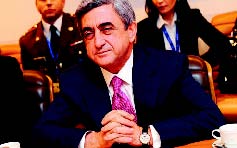Armenia’s President Serzh Sargsyan and Prime Minister Tigran Sargsyan may share the same surname, but the two are not related. This is not unusual, as Sargsyan is a very common name in Armenia.
President Sargsyan was born in the Nagorno-Karabakh region – a small strip of land that is at the centre of a bitter dispute between Armenians and Azerbaijanis. The region gave modern Armenia many of its prominent public figures, and the tensions there have served to forge the country’s identity.
After studying in Yerevan, Sargsyan worked in his hometown of Stepanakert as a metal turner in a factory. At the same time he was making rapid advancement in the local branch of the Communist Party. By 1988, Sargsyan had risen to assistant of the First Secretary of the party’s regional committee in Nagorno-Karabakh.
But then the war with Azerbaijan broke out, which propelled Sargsyan into prominent positions within Armenia’s elite. As tensions arose, the future president – who had completed training in the Soviet army – became chairman of the Nagorno-Karabakh Republic self-defence forces committee. He organised several battles during the war and is now considered to be one of the founders not only of Nagorno-Karabakh’s army, but also of the Armenian armed forces.
In 1993 Sargsyan became Armenian defence minister. Six years later, President Robert Kocharyan, also from Nagorno-Karabakh, made Sargsyan his chief of staff. In 2007 Sargsyan rose to the post of prime minister and ran for presidential election that same year with the full backing of President Kocharyan (he was succeeded as prime minister by Tigran Sargsyan).
Officially, Sargsyan won that election by a large margin, but the opposition disputed this and accused Sargsyan’s party, the Republican Party of Armenia, of vote-rigging, vote-buying and manipulation of the media. Protests ensued which were violently suppressed. Eight people were killed by police and a media blackout followed.
On 9 April 2008, as he was being sworn into office, Sargsyan spoke of the “painful events” which arose as a result of the opposition protest. He said: “I urge everybody to look forward, together, to seek and find the way for reconciliation, development and future of Armenia.”












